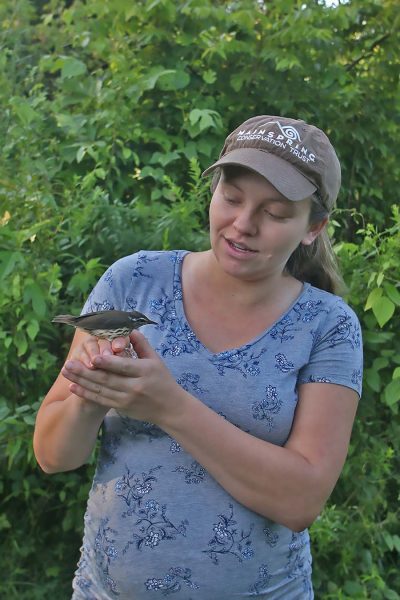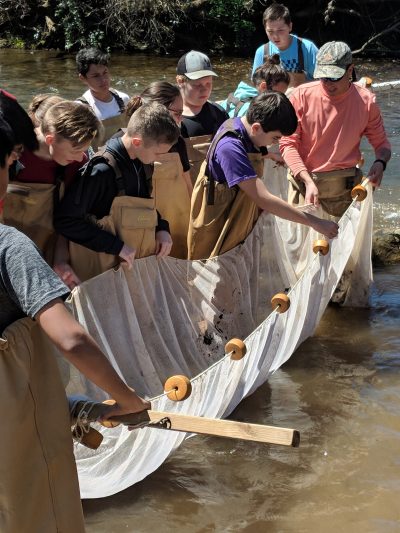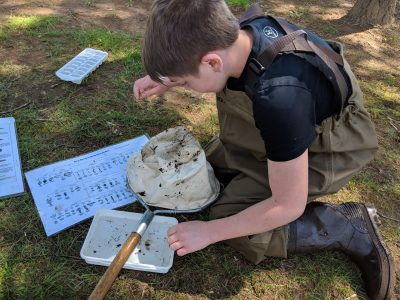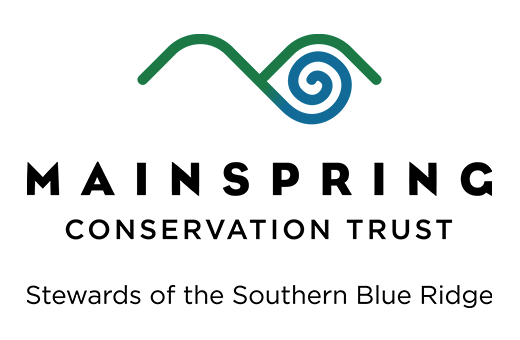By: Kelsey Richardson
August 8, 2018
 Mist settled over the Valley as Mark Hopey and Kathy Gunther walked through the tall dewey grass of Welch Farm, monitoring birds to put toward the station’s last set of data for the year.
Mist settled over the Valley as Mark Hopey and Kathy Gunther walked through the tall dewey grass of Welch Farm, monitoring birds to put toward the station’s last set of data for the year.
Hopey and Kathy, who work for the Southern Appalachian Raptor Research, travel to four stations across western North Carolina every summer. For the past four years, the organization has gathered research at Welch Farm.
For 10 days, Hopey, Kathy and other members of their team have taken measurements of mostly songbirds to send to the Institute of Bird Populations. Welch Farm is one of about 500 stations nationwide that gathers such information.
“Our goal is to collect data in different habitats to see what’s breeding and what’s surviving,” Gunther said.
She said the four stations her organization monitor encompass different habitats. Hopey describes Welch Farm as relatively “feral.”
Owned by Mainspring Conservation Trust, the farm is not managed for agriculture. The undeveloped land’s thick brush and river allow for birds to thrive and return every year.
Hopey said unlike the other three stations, Welch Farm’s habitat provides a home for Louisiana waterthrush and willow flycatchers. This year’s most common species of bird found at the site included the gray catbird.
Hopey and Kathy catch the birds through setting up 10 nets around the farm. Each year, the nets are placed in the same locations.
Once removed safely from the nets, they take the birds’ measurements, then release them back where they were found. If the bird has a numbered band on its leg, they mark down its identification. If not, they usually place a band around the bird’s leg.
In addition to members of Southern Appalachian Raptor Research, volunteers contribute to the Welch Farm bird monitoring.
Trekking through the farm during the early morning hours on July 30, Bob and Lynn Appleget took their bird-watching to a new level. Lynn said she mostly watches birds from her property, but never receives the opportunity to get hands-on experience with them.
“It’s just cool,” she said. “I learned about the worm-eating warbler. This is a good reason to be outside.”


 “There’s always a few students who just make your day because they make some comment like ‘I had no idea this was in this creek, I come to this park and play baseball or softball and had no idea,’” Meador said. “You can tell they’re genuinely interested and excited to learn something. Other students find out the outdoors isn’t such a scary place, and they’re out here in a whole new world. You can see some students show up a little skeptical or hesitant, and by the end they’re really excited.”
“There’s always a few students who just make your day because they make some comment like ‘I had no idea this was in this creek, I come to this park and play baseball or softball and had no idea,’” Meador said. “You can tell they’re genuinely interested and excited to learn something. Other students find out the outdoors isn’t such a scary place, and they’re out here in a whole new world. You can see some students show up a little skeptical or hesitant, and by the end they’re really excited.”
